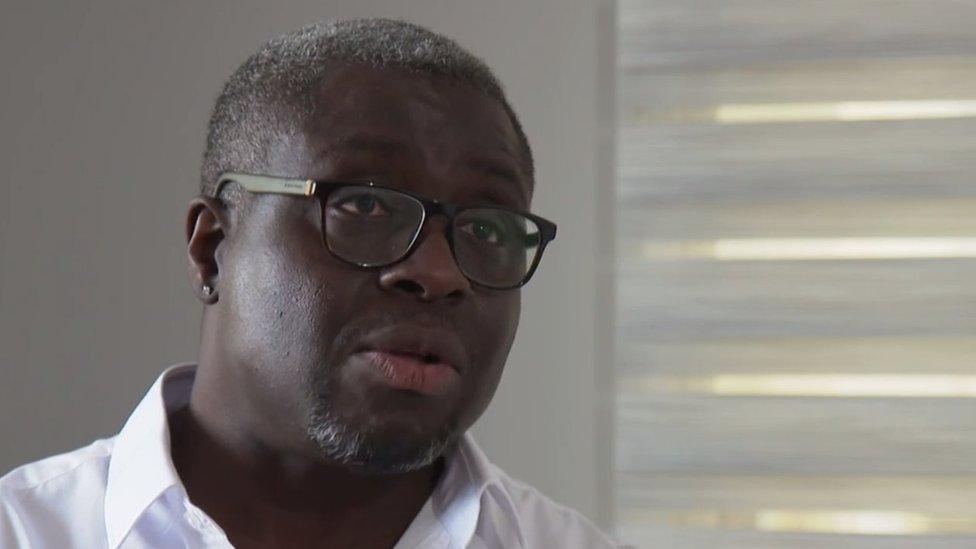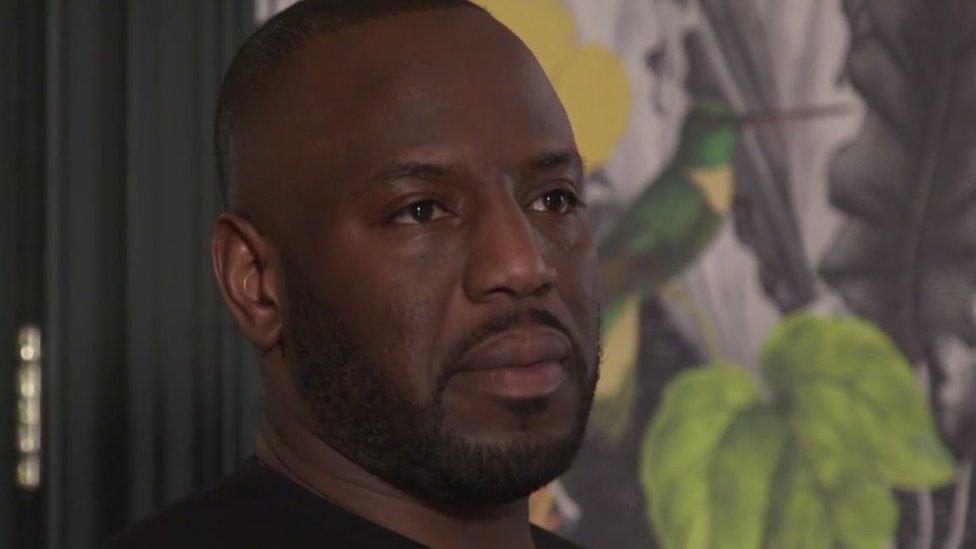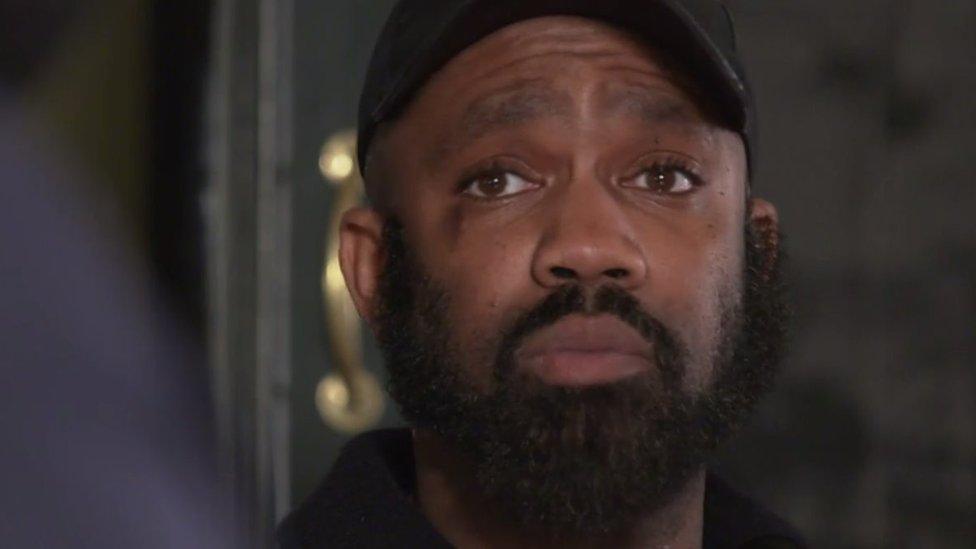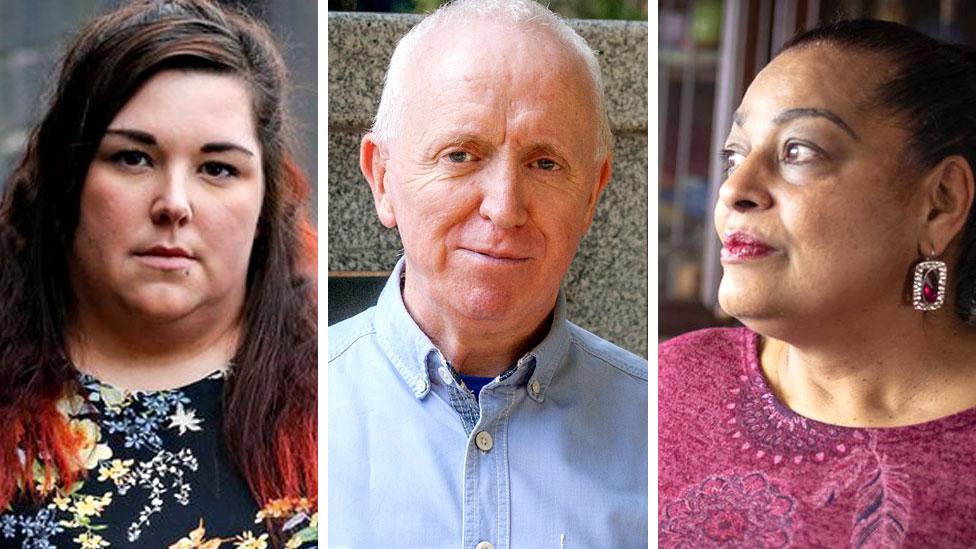Why abused black men are staying silent
- Published
"I became withdrawn completely after rape"
Male survivors of childhood sexual abuse within the black community are being let down by the government, the head of a group of MPs has said. BBC reporter Ben Hunte - who was sexually abused himself - hears from men who say their needs have been overlooked.
"I tried to bury it. I tried to move on, but it stays there," says Chris - not his real name.
Chris was speaking after the publication of a government report looking into how adult survivors are supported in the UK.
When he was 11, he says a 19-year-old prefect, who he considered a friend at school, raped him.
He breaks down as he tells his story.
"I became withdrawn completely," he tells me.
"Then I was sick for a while. I think it was depression, although when you're a kid you don't know these things.
"It messed me up, and it shaped my personality today. It's like a scar you can't get rid of."
Chris says he still lives with the pain. It took him years to seek help.
"I didn't speak to anybody. I didn't address it.
"And because I didn't address it, it didn't go away."
University breakdown
He is not alone.
I was sexually abused as a teenager by someone older who I trusted.
When I looked for help, I could not find any.
I even tried to find something to show that I was not the only black man out there who had been abused as a young person, but discovered nothing.
After having a breakdown at university I was made to see a therapist, but many black men never speak up.
When they do, experts believe this often takes place at crisis point.

Willis Atherley-Bourne says many services for survivors are not representative of the black community.
Willis Atherley-Bourne, a trauma therapist, says "a large number of men will [only] begin to speak about their abuse when they're in the criminal justice system".
He added: "They're at that broken point, and there's nothing else to lose."
He says many black men end up self-medicating, and do not receive the professional support they need.
Support needs 'unmet'
The All-Party Parliamentary Group (APPG) for Adult Survivors of Childhood Sexual Abuse's report said that some 365 survivors came forward about their experiences.
Fewer than a quarter of them said that the NHS as a whole met their support needs.
Only 16% said the police guided them towards support services.
But the report also urged the government to do more research into the experiences of black and LGBT survivors.
Its chair, Labour MP Sarah Champion, said the government is "clearly not serving the black and LGBT community when it comes to supporting adult survivors of sexual abuse".
She added that the APPG would be looking into this further.
A government spokesman said: "We are working across government and with the third sector to ensure that victims of this dreadful crime receive the right emotional, medical and psychological support as they rebuild their lives."

Kevin says many black men do not think about reporting an offender to police
For Solse and Kevin - who have both struggled with the effects of sexual abuse they suffered as children - there are a variety of reasons why black male survivors are not seeking help.
One of them is a distrust of police.
"As black men we don't think about, 'we're going to police to get that person arrested'," Kevin explains.
Part of the problem is also the stigma - and not knowing what the black community will think of them.
"We are also coming from a culture where you shut up and put up," Solse says.
"You don't talk about your situation," he says, especially not to someone outside the family, such as a therapist.

Solse says he grew up in a culture where people would not seek therapy
The men say this is made worse by the fact there are no specialist charities for black male survivors, and that the more mainstream charities do not understand the cultural differences.
"If I saw a documentary or imagery of sexual abuse growing up that had black men where they spoke out, it probably wouldn't have taken me 30 years to come forward," says Kevin.
'Visibly not seen'
Mr Atherley-Bourne agrees, saying black male survivors are "visibly not seen".
Many services, he believes, show "white European males", and are not representative of the black community.
Chris says if he had had access to a black GP or therapist "it would make a huge difference. I could easily relate to them".
But the lack of services tailored towards the black community, he adds, means people like him are unwilling to speak publicly.
"The stage has not been set to come out and have this conversation freely."
For information and support, visit the BBC's Action Line website.

Follow the BBC's Victoria Derbyshire programme on Facebook, external and Twitter, external - and see more of our stories here.
Related topics
- Published20 April 2019
